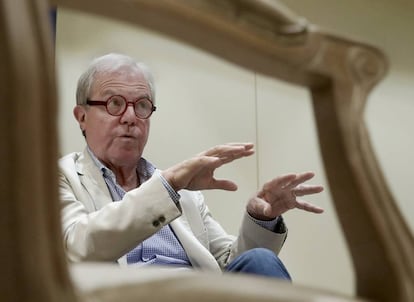Nicholas Negroponte: “Your children and my grandchildren will live to be 150”
The US tech visionary, founder of the MIT Media Lab, was in Madrid for a talk on innovation, and he spoke with EL PAÍS about his predictions for the future


Time has proven him right on nearly all counts. Nicholas Negroponte, 75, is in Madrid for Cruce de Caminos, a one-day event to discuss innovation, technology, economics and culture. Negroponte is confident about his vision for the future, which sounds quite bold. Then again, the things he was saying 30 years ago sounded bold then, too.
Asked about the next upcoming milestone for humanity, this tech visionary – who was the first investor in the influential magazine Wired – said that the digital world is already integrated into our lives, and that what comes next will no longer be extrapolations of computing. Instead, bioengineering will be “one of the next big things.”
“We will have genetically modified humans and we will correct nature’s mistakes. It will be a very different future,” he says.
We’ll see machines with a sense of humor, and it will be amazing
The founder of MIT’s Media Lab also believes that humans will soon be living to the age of 150 or 200. “This will happen with the next generation. It’s a bit late for us, because reverting the ageing process is harder. But there is no doubt that your children and my grandchildren will live to be 150. And we’ll make people with disabilities walk again, and later we will be able to eliminate rare diseases.”
Negroponte also discusses new ways of feeding the world with artificially produced food. “Creating meat that does not come from cows is a wonderful project,” he says, noting that humans will be able to replicate bovine cells without hurting the animals and without the carbon dioxide that they release into the air, while saving significant amounts of water.
Technology will also be “the only solution to climate change. There is no other solution,” says the author of the best-selling 1995 book Being Digital, which predicted many of the technological advances that have since come to pass.
“We need to find the way to produce energy, not necessarily from renewable sources like the wind or the sun, but by making nuclear fusion work. In 50 years we will have a different economy and a better world thanks to it.”
Negroponte, an architect by trade, heralds great progress for humanity. But what about the political and economic interests that might prevent that progress from reaching a majority of people?
The humanities are the most important thing you can study
He says that corporate interests often slow down some of this progress, but not for very long. Oil interests, for instance, can put the brakes on alternative technologies.
“That’s why it’s so difficult to make predictions about when some things will get here, because often the delays come from external forces that have nothing to do with the technology,” he says.
The conversation moves on to 5G, the mobile communications system that has sparked a battle between the US and China. But Negroponte plays down its relevance, while noting that the US “gave up on telecom technology 15 years ago.” He claims that 5G is not going to be a game changer, and that in any case, China is far ahead of the US.
“The main actors are no longer American companies. This sudden interest in 5G, and in Huawei in particular, seems unbelievable to me, because 5G is not as important as they’re making it out to be. It’s just an incremental change over 4G. The milestone was 3G. This is not nuclear fusion.”
Negroponte is optimistic in the face of technological change, yet everything suggests that public opinion is switching from enthusiasm to pessimism. He concedes that this is the case.
“There is a growing sense of skepticism all over the world, that technology has created many of the problems that we now need to solve,” he says. “If you look at it objectively and with perspective, technology has brought many solutions, such as in medicine, and the problems are mostly due to the way we use the technology.”
These days, the internet giants are viewed as a great oligopoly that does big business with our data – a Big Brother of sorts. Negroponte offers an anecdote to illustrate how this is viewed differently depending on where you are.
Young people these days want to be Mark Zuckerberg, they don’t want to be Alan Turing. It’s disappointing
“At the time of [Edward] Snowden’s revelations, many Americans like myself were surprised that the government was watching us. If you go to China, and I’ve just been there, you see hundreds of cameras on the street doing facial recognition and creating nearly perfect security. And people are satisfied. They say: all right, maybe it’s violating what you Westerners consider privacy, but we have no crime. These are things that are viewed differently by each culture.”
Europe may be the world leader in privacy protection, he notes, but on the other hand “a lot of people die in Germany because it is illegal to share data that could save them. It is a difficult balance. If I get hit by a car, I don’t want my medical data to be protected, when the ambulance gets here I want them to know everything.”
Asked if Silicon Valley giants should be broken up like the monopolies of the past, as recently proposed by US Senator Elizabeth Warren, Negroponte said he is not sure that such a move would guarantee people’s privacy. Then again, he notes that it’s surprising how little some of those big companies contribute to knowledge and science. “Young people these days want to be [Facebook founder] Mark Zuckerberg, they don’t want to be [computer scientist and mathematician] Alan Turing. It’s disappointing. We need people who will invent things and be imaginative, like Turing.”
The tech guru admits that he doesn’t use social media very much, but that it’s clear it is having an impact on democracy. “In some places, it’s creating democracy. In others, it’s weakening it. The balance is probably in favor of democracy.”
Several studies have alerted about the destruction of millions of jobs due to robotization, even in the more intellectual activities. This is creating social anxiety. What is the future of jobs?
Negroponte says it is actually easier to automate most intellectual activities than jobs such as preparing fast food. “It is easier to have a robot lawyer or accountant,” he maintains. But jobs displacement will not depend on intellectual abilities. “At some point we’ll have to rethink the concept of work. Part of the concept has to do with having a sense of purpose. People will always have a purpose, but it might not be bringing a salary home, which is what defines employment today.”
So will there one day be real artificial intelligence that is self-aware? Negroponte says that this is the really important question, yet most people don’t ask it.
“I’m not sure I’ll see it in my lifetime. But before that, we’ll see machines with a sense of humor, and it will be amazing. Another question that I find interesting is: why do humans appreciate music?”
This pioneer in the field of computer-aided design defends the humanities in our hyper-technological world. “The humanities are the most important thing you can study.”
English version by Susana Urra.
Tu suscripción se está usando en otro dispositivo
¿Quieres añadir otro usuario a tu suscripción?
Si continúas leyendo en este dispositivo, no se podrá leer en el otro.
FlechaTu suscripción se está usando en otro dispositivo y solo puedes acceder a EL PAÍS desde un dispositivo a la vez.
Si quieres compartir tu cuenta, cambia tu suscripción a la modalidad Premium, así podrás añadir otro usuario. Cada uno accederá con su propia cuenta de email, lo que os permitirá personalizar vuestra experiencia en EL PAÍS.
¿Tienes una suscripción de empresa? Accede aquí para contratar más cuentas.
En el caso de no saber quién está usando tu cuenta, te recomendamos cambiar tu contraseña aquí.
Si decides continuar compartiendo tu cuenta, este mensaje se mostrará en tu dispositivo y en el de la otra persona que está usando tu cuenta de forma indefinida, afectando a tu experiencia de lectura. Puedes consultar aquí los términos y condiciones de la suscripción digital.








































